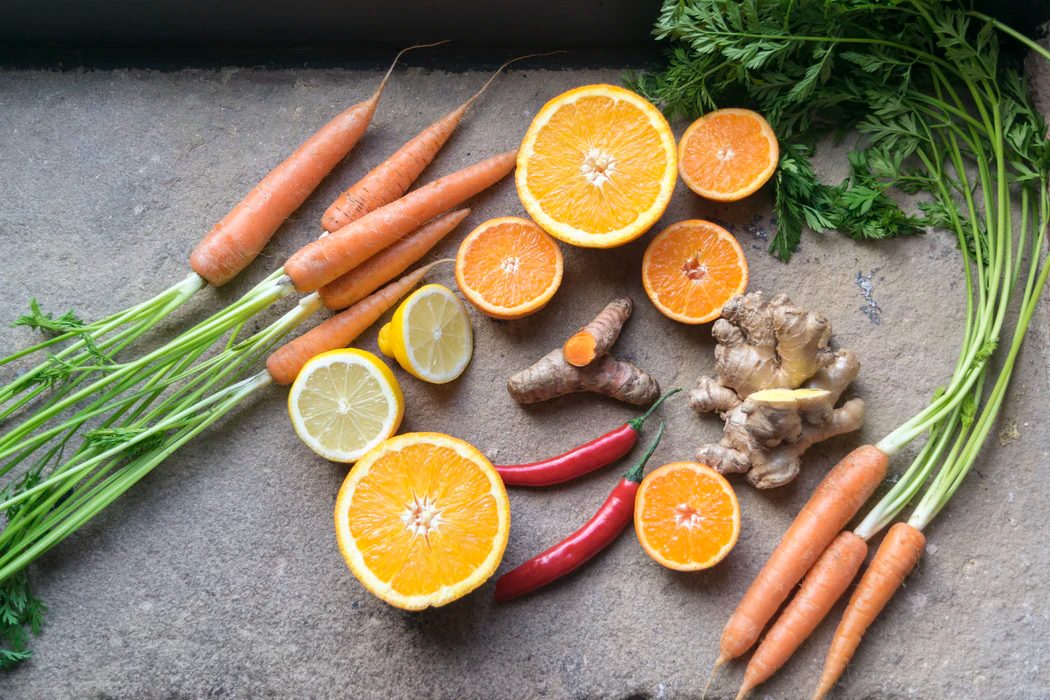
Natural Medicine Cabinet: 6 Turmeric and Ginger Benefits
July 5, 2021
Can spices like turmeric and ginger help enhance your health ? Yes! Flavor boosting habits in the kitchen – including the use of spices that reduce inflammation – can boost flavor while offering health benefits, too. It’s like a BOGO deal!
As a woman seeking to improve digestion and wellness, you’re not going to want to miss this post.
Let’s find out how turmeric and ginger might help you! And just as important: which potential remedies are not yet supported by the research.
Turmeric and ginger benefits: more than just flavor!
Turmeric and ginger are two spices that can be used in cooking, but they also have a variety of health benefits. They’re more often studied individually, but we can combine the two for even more inflammation quenching powers.
But first – what are they, exactly?
What are turmeric and ginger?
Before we dive into the benefits of turmeric and ginger, let’s first cover what they are. Both turmeric and ginger are spices that come from roots, or more specifically, rhizomes, that grow underground.
You can purchase them fresh from your well-stocked grocery store. They’ll be in the produce section, possibly with the international produce. They’re both covered with papery thin tan skin and are firm to the touch. Turmeric has a bright yellow center and ginger is a bit paler.
You can buy both ginger and turmeric dried and ground in the spice aisle. In addition, you can purchase candied ginger. Candied ginger might be in the bulk section of your grocery store, in the baking section or even in the spice jars.
A vegetable peeler or spoon easily removes the thin skin and then you can use a grater, a robust garlic press or a knife to crush the turmeric and ginger into a paste. Alternatively, you can puree fresh garlic and turmeric, store in a glass jar and refrigerate. Your weeknight sauteed veggies will level the heck up with this inflammation boost added to the skillet!
Beyond the spice aisle, you may want to consider purchasing a high-quality supplement to boost your intake of these two spices. We’ll chat about what goes into a high-quality supplement towards the end of this article.
For now: turmeric and ginger benefits: where do we begin? These two pungent spices add delicious flavor to food and drinks, but you know what else? They offer a multitude of health benefits, especially around reducing inflammation – a benefit for most of us!
Uses for turmeric
In the kitchen, turmeric is the star of yellow curries from across the Asian continent. Turmeric is also the active ingredient of a soothing golden milk latte; a warm drink that combines your favorite milk with turmeric, a pinch of pepper, cinnamon and ginger for flavor and a bit of your favorite sweetener. I love a bit of local raw honey or blending with a date!
But the exciting news is that turmeric and ginger have benefits far beyond flavor; they might just be the first two additions to your personalized natural medicine cabinet. While pharmaceutical medications have an important role in medical treatment, they may come with side effects that make them less desirable. As a functional nutrition dietitian, I provide my clients with a wide range of customized treatment options to feel their best, based on their functional lab testing, goals and lifestyle priorities.
Let’s dig into the science to see how these two spices may improve your health and wellness, not just your next menu plan!

Turmeric & Inflammation
Scientists now believe that inflammation caused by chronic conditions is an underlying cause of almost every Western disease, including heart disease, cancer, diabetes and Alzheimer’s. Reducing inflammation reduces your risk of all of these diseases, and more, including depression and anxiety.
Turmeric has a powerful ability to reduce inflammation. Having a wide variety of fresh and dried herbs and spices throughout the week offers your body many tools to reduce inflammation each day: this includes turmeric and ginger, but also rosemary, thyme, hot peppers, black peppers and more.
Turmeric can actually match some anti-inflammatory medications, without the same risk of side effects – that’s powerful (1)! Next time you have a pain, try a turmeric capsule, with a meal, and see how much better you feel.
Turmeric & Allergies
If you suffer from seasonal allergies: keep reading!
The active component of turmeric is a compound called curcumin. There is clinical research showing that a certain curcumin product, when taken daily for two months, may reduce nasal symptoms in people with allergic rhinitis. The study participants taking the turmeric supplement had less sneezing, itching, runny nose, and congestion than those taking a placebo (2).
This is great news for anyone wishing to skip pharmaceutical options for managing allergies and still have an option that works!
Turmeric & Depression
Most research supports that turmeric is more effective than a placebo in decreasing symptoms of depression. The benefits may take six weeks to be seen. Research studies focus on taking at least 1 gram of turmeric per day to see the benefits.
Some of the studies look at turmeric in combination with a prescription antidepressant medication and see better results: sometimes the best treatment plan is a combination of pharmaceutical and herbal (3).
Note: we never recommend changing or stopping medications before speaking with your prescribing physician.
Turmeric & Arthritis Relief
Research has shown that turmeric can help relieve the pain and inflammation from osteoarthritis and rheumatoid arthritis by reducing levels of inflammatory substances like prostaglandins, leukotrienes, and thromboxanes: these are all chemical messengers that cause inflammation – turmeric fights back to calm the inflammation flames.
Other uses of turmeric to skip (for now)
Turmeric has been used for a number of other conditions. But so far, there is no published research to support it’s use for these conditions, even if I have seen turmeric be used for several conditions with good results. While there may be studies that support the use of turmeric for these conditions in the future, we don’t have the data yet today. These conditions include:
-
Acne
-
Asthma
-
Crohn’s disease
-
H. Pylori
-
PMS
-
Stress
-
Wound healing
Now that we’ve discussed what the science does – and does not – support using turmeric for, how about ginger? Let’s take a look!
Uses for Ginger
You may be most familiar with ginger baked into holiday desserts each winter. But ginger truly is delicious in a wide range of savory dishes and hot drinks, too!
And just like with turmeric, ginger can boost your health, too. Let’s dive into the research!

Ginger & Nausea
Feeling green? Ginger is your go-to for reducing nausea and vomiting, especially if your symptoms are related to your pregnancy. The research is not as strong for motion sickness, unfortunately.
And while ginger ale might be your first thought for getting a dose of ginger, most drinks have very little – if any – ginger inside. A better option might be ginger tea, made with fresh or dried ginger. Or maybe some ginger candies can help to calm your nausea.
You can also take ginger as a supplement in a capsule. Just make sure that you’re purchasing a high-quality brand.
Ginger & Dysmenorrhea
If you’re struggling with dysmenorrhea, taking oral ginger might help to reduce your pain. Clinical research shows that ginger might be comparable to ibuprofen: you can choose to take both the herbal and pharmaceutical together, or just try the herbal (4).
Ginger & Inflammation
Just like turmeric, having ginger as a regular part of your meals and even supplements can reduce inflammation. And in a modern life that is very inflammatory with our typical, highly-processed food choices, lack of sleep and high stress levels, reducing inflammation wherever we can is important.
And remember how we mentioned that inflammation can be the common risk factor for many chronic illnesses, including heart disease, diabetes and cancer? Ginger is one powerful tool in your tool belt to fight back. Turmeric and ginger lower your risk of chronic inflammation.
And if you just had an intense spin class or run? Ginger can reduce muscle pain after your vigorous workout (5).
Other uses for ginger to skip (for now)
Just like with turmeric, there are some benefits that people would like to attribute to ginger supplements, but we don’t yet have strong data to support it. This may change in the future, but for now, I don’t recommend ginger for the following reasons:
-
Asthma
-
Constipation
-
Diarrhea
-
IBS
-
Migraine
If you’re interested in taking a therapeutic dose of turmeric or ginger, can you get enough from your spice jars? Let’s look at ginger and turmeric supplements vs. powder in the next section.
All about supplements: what you need to know!
Now that you know all of the potential benefits of eating turmeric and ginger, here are a few resources to be able to make an informed decision about your symptoms!

Ginger and Turmeric supplement vs. powder?
Incorporating turmeric and ginger powders from your spice cabinet into your stir-fries, smoothies and golden milk lattes are a great way to boost the antioxidant cell-boosting properties of your favorite meals and snacks. Keep up the good work!
The turmeric spice powder in your jar only has about 3% of the active component (6). However, a supplement may offer a greater amount of the active ingredients of these two spices, consistently. If you’re intending to use turmeric or ginger powder for medicinal purposes, the supplement is likely the way to go.
Can turmeric supplements cause acid reflux?
If you take too high of a dose of turmeric, it may cause gastrointestinal (abbreviated as GI) symptoms, including acid reflux, nausea or even vomiting. But interestingly, a lower dose of turmeric may actually help to alleviate GI symptoms, including irritation of the esophagus.
So, pay attention to how you feel after taking the supplements. Follow recommended doses and timing made for you by a knowledgeable healthcare professional. I’d be happy to help you with that!
Should turmeric supplements be taken with food?
Curcumin, the active component of turmeric, is fat-soluble. For best absorption of curcumin, take your turmeric supplements with a meal that has fat, such as a delicious curry with canned full-fat coconut milk or a golden milk latte using your favorite full-fat milk.
For even greater absorption, take turmeric with black pepper. The piperine will further increase absorption by as much as 2,000% – dang! (7). Some supplements contain both turmeric and piperine to optimize absorption – more on that in a moment.
Best turmeric supplement to buy?
In the US, supplements are not well regulated. This means even as a savvy shopper, there can be a high-quality supplement bottle right next to a supplement that has heavy metal contamination on the shelf, and you really can’t tell the difference.
Some turmeric extract is standardized to curcuminoid concentration, with a range of 75% to nearly 100%. Some products also contain piperine – a compound from black pepper — which helps improve the bioavailability of turmeric.
The best turmeric supplement to buy is one that has all of the active components that the label claims are included (for example, curcumin from turmeric) in a form that optimizes absorption and is free of contamination. And the good news? I can help you find the best one, for you!
Best ginger supplement?
And the best ginger supplement? Same as with turmeric: purchased from a high-quality, 3rd-party verified company in the dose that matches the research for your intended use.
I support my clients in finding the best, high-quality, effective supplements to support their health and wellness goals. For access to my online dispensary sign up here.
Turmeric and ginger benefits: key takeaways
Here are the most important takeaways from this post:
-
Turmeric and ginger are both rhizomes: plant roots that can be prepared fresh or dried and ground into powder.
-
Adding fresh or dried spices – including turmeric and ginger – boosts flavor to your dishes while reducing inflammation and risk of several diseases, including depression, cancer and allergies.
-
A high-quality supplement may provide you with the right dose more easily than amounts typically found in recipes.
Let’s chat!
As a functional nutrition dietitian, I work with women to improve their digestion and gut health by identifying and addressing root causes. Just treating symptoms does not offer long-term relief.
Leave a Reply